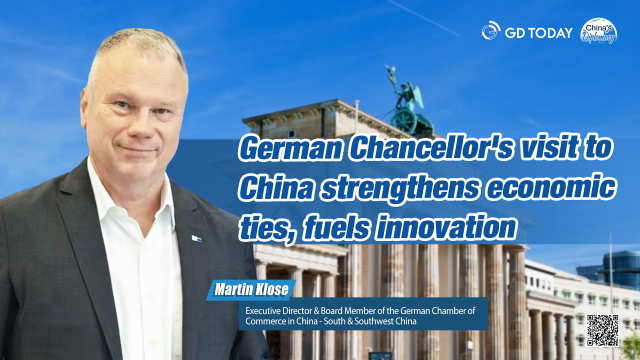German Chancellor Olaf Scholz's recent visit to China from April 14 to 16 has sparked optimism for deeper economic cooperation and innovation between the two nations, highlighting the strategic importance of their relationship.
Martin Klose, Executive Director & Board Member of the German Chamber of Commerce in China - South & Southwest China, told GDToday that the signal which was sent is a strong one in terms of the commitment to continuing business relations here in China, encouraging further exchange, further development, and highlighting the concerns of German companies.
German enterprises embrace China's vast market opportunities
The business leaders who accompanied Scholz on his visit to China came from a wide range of industries. Klose said, "It's important for the representatives of the big German enterprises to come over, to engage, to meet their employees, and to facilitate more investments and a better understanding of the country."
Klose emphasized the significance of the Chinese market for German enterprises. With China being Germany's main trading partner for eight consecutive years and over 1 million jobs created by German companies in China, he stressed that "the Chinese market is too big to miss, right?"

Thriving in the Greater Bay Area's dynamic industrial landscape
Klose shed light on the thriving industrial landscape of the Guangdong-Hong Kong-Macao Greater Bay Area (GBA), where approximately 500 German companies have established a strong presence, particularly in machinery and electronic manufacturing.
Statistics from the Guangdong Sub-administration of the General Administration of Customs of China show that Guangdong's imports and exports to the EU in the first quarter of this year were 228.13 billion RMB, a year-on-year increase of 3.7%. Germany, the Netherlands, and France are the top three countries for Guangdong's imports and exports with the EU. Guangdong's imports and exports with Germany and France increased by 5% and 11.1%, respectively.
In the first three months, Guangdong has registered 51.08 billion RMB in terms of imports and exports with Germany, its largest trading partner within the EU, accounting for 22.4% of Guangdong's total trade volume with the EU in the same period.
In Klose's opinion, Guangdong is at the heart of the GBA, which is a very competitive region. "It's natural for German companies to be here right in the heart of the GBA. All of those mega cities have their clusters for certain industries."
Klose highlighted the strategic advantage of locating within the GBA, citing its competitive environment and robust logistics network that facilitates connectivity with customers and suppliers.
Speaking of the ongoing Canton Fair, which is a testament to connectivity, he said that there are plenty of German companies in the Canton Fair, which has its charm and attracts representatives from Germany.
Seizing opportunities in high-tech manufacturing and green innovations
As both Germany and Guangdong pivot towards high-tech manufacturing and green innovations, collaborative opportunities are emerging as key focal points.
"If you look at high-level, high-tech manufacturing topics, green technologies, and biotech are all trendy topics where German companies can bring a lot of experience to the table," said Klose.
According to Klose, German expertise in areas such as green technologies aligns closely with China's ambitious decarbonization goals, presenting fertile ground for cooperation.
New energy has been a highlight during Scholz's visit. In Klose's view, Guangdong is a base for NEVs, and there are many great Chinese companies that have developed fantastic products. "German technology will also contribute to supporting developments even further," he said.
Reporter | Hannah
Video | Jimmy
Poster | Lulu
Editor | Steven, Nan, Monica, Will, James
















